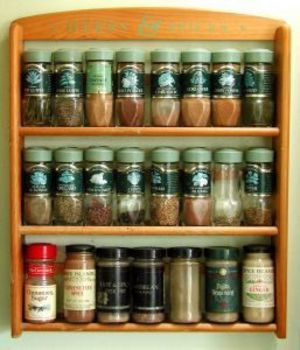Spices not only improve the taste of meals, but they can also improve your health. Studies have shown that some common spices already in the kitchen can effectively fight disease and pain, including inflammation. Not only that, but including these five spices in your diet can help reduce the need for anti-inflammatory drugs. Here are five herbs that can help fight inflammation.
What is Inflammation?
Inflammation is a normal process of the human body, the immune system’s response to a foreign invader. Most often this invader is bacteria or a virus. The inflammation problem is when the body starts producing inflammation where no foreign invader is present. This type of inflammation, sometimes referred to as chronic or low-level inflammation, is involved in diseases ranging from heart disease to cancer, as well as Alzheimer’s disease, diabetes, lupus, arthritis and multiple sclerosis. Researchers believe that reducing chronic low-level inflammation is key to preventing these and other diseases.
Inflammation Fighting Super Spice Turmeric
Turmeric is the main ingredient in curry powder. Natural health practitioners have long used this member of the ginger family to soothe upset stomachs and ease chronic arthritis pain. Turmeric has been found to have anti-inflammatory properties. It can also help lower blood pressure, blood sugar and cholesterol levels. How do these exotic spices fight inflammation? Turmeric contains a compound called curcumin that works as a COX-2 inhibitor, the same inhibitor present in NSAID anti-inflammatory drugs. The best part: Turmeric appears to offer the same anti-inflammatory benefits as NSAID medicine without the pesky side effects . Curcumin has also been found to help reduce swelling of inflamed tissues in the body. Ongoing research on curcumin focuses on its use in relieving osteoarthritis and rheumatoid arthritis. If you are not a fan of curry powder, there is a form of turmeric available as a supplement.
Ginger Inhibits Inflammatory Enzymes
Many people know about ginger’s ability to relieve nausea, but ginger is a natural way to fight inflammation. Ginger contains gingerols that have been found to have powerful anti-inflammatory properties. Like turmeric, the compounds in ginger work by inhibiting COX-2 enzymes, which help with inflammation in the body. Researchers in chiragra in patients success pain in arthritis patients. Although fresh raw ginger is most potent, ginger is also available in supplement form. Ginger tea is also an option for those who do not like fresh, raw ginger. Simply steep freshly sliced raw zinger root in boiling water for 1 minute. The stronger the beer, the steeper the minutes added.
Heat From Inflammation with Cayenne Chili Peppers and Chili Peppers
Cayenne, pure chili and peppers are three spices that are effective in fighting inflammation. These three wonderful spices all contain capsaicin. Not only does this spice give capsaicin its heat, but it also helps fight inflammation by inhibiting Neuropeptide Substance P. Substance P is responsible for causing nerve fibers in the body to swell. For more information on health benefits capsaicin see Surprising Health Benefits of Capsaicin: Turn the Heat on Health raise your
Allium Ponticum Stop Inflammation in Its Tracks
Recent research finds that garlic, a pungent spice, may have medicinal properties that help prevent cancer, heart disease, improve blood pressure and cholesterol levels and boost immune system. But garlic is also a super-spice in the fight against inflammation. Enzymes in garlic help to generate anti-inflammatory prostaglandins and thromboxanes. Allicin, one of the compounds in garlic that causes its pungent smell, is a powerful antioxidant that helps reduce inflammation by inhibiting the enzymes responsible for inflammation.
Use oregano to spice up your health
Oregano not only smells good, but is also beneficial. Oregano has antifungal and antibacterial properties and recent research has found that the aromatic spice can be powerful in fighting inflammation. Scientists in Germany and Switzerland found that when mice were given oregano turgid hooves, they saw a 70 percent reduction in swelling. The key to oregano’s anti-inflammatory power is a substance called betacaryophyllin (E-BCP). This active ingredient in oregano has been found to inhibit inflammation as well as help reduce the risk of developing osteoporosis and arteriosclerosis.
Disclaimer: This article is intended for educational purposes only and is not intended to replace medical advice. or of other medical doctors.
Sources
MD Web Spices and Herbs: Their Health Benefits
WebMD: Turmeric (Curcumin)
Anti Aging Medicine
